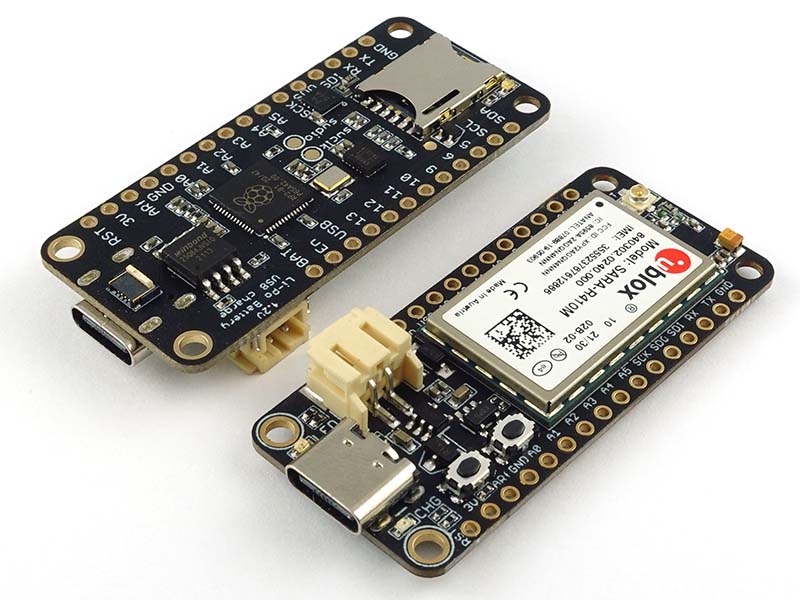
Challenger RP2040 LTE by Invector Labs
The Challenger RP2040 LTE is an Arduino/CircuitPython compatible Adafruit Feather format microcontroller board based on the Raspberry Pico chip.
This board has been designed with portable applications in mind. By using the powerful dual core RP2040 combined with 8Mbyte of flash memory, you get a device that can handle pretty much anything you can throw at it. For instance, if you let one core handle the LTE modem and the second core do all the UI stuff, you get an extremely responsive system. Not to mention that the 8 MByte of FLASH memory will let you install any (or all) CircuitPython support libraries that you will ever need.
Technical details
- Raspberry Pi Pico Dual Core Cortex-M0 @ 133 MHz
- 8 MByte FLASH Memory
- 264 KByte SRAM Memory
- 1 Hardware I2C channel
- 1 Hardware SPI channel
- 1 Hardware UART for the user (Serial1)
- 1 Hardware UART connected to the network processor (Serial2 @ 1 Mbit/s)
- 12 Bit ADC.
- SARA-R410M-02B
- LTE Category M1/NB1
- Multiregion
- Data rate M1: up to 375 kb/s UL, 300 kb/s DL
- Data rate NB1: up to 62.5 kb/s UL, 27.2 kb/s DL
- LiPo charger circuit with 250 mA charging current
- Standard LiPo battery connector
- USB-C connector
- Bi2C
Purchase
Contribute
Have some info to add for this board? Edit the source for this page here.
CircuitPython 10.1.3
This is the latest stable release of CircuitPython that will work with the Challenger RP2040 LTE. Use this release if you are new to CircuitPython.
Modules included in this download
_asyncio _bleio _bleio (HCI co-processor) _eve _pixelmap adafruit_bus_device adafruit_pixelbuf aesio alarm analogbufio analogio array atexit audiobusio audiocore audiomixer audiomp3 audiopwmio binascii bitbangio bitmapfilter bitmaptools bitops board builtins builtins.pow3 busdisplay busio busio.SPI busio.UART codeop collections countio digitalio displayio epaperdisplay errno floppyio fontio fourwire framebufferio getpass gifio hashlib i2cdisplaybus i2cioexpander i2ctarget imagecapture io jpegio json keypad keypad.KeyMatrix keypad.Keys keypad.ShiftRegisterKeys keypad_demux keypad_demux.DemuxKeyMatrix locale lvfontio math memorymap microcontroller msgpack neopixel_write nvm onewireio os os.getenv paralleldisplaybus pulseio pwmio qrio rainbowio random re rgbmatrix rotaryio rp2pio rtc sdcardio select sharpdisplay storage struct supervisor synthio sys terminalio tilepalettemapper time touchio traceback ulab usb usb_cdc usb_hid usb_host usb_midi usb_video vectorio warnings watchdog zlibFeatures: Wi-Fi, USB-C, Breadboard-Friendly, Feather-Compatible
CircuitPython 10.2.0-alpha.1
This is the latest development release of CircuitPython that will work with the Challenger RP2040 LTE.
Alpha development releases are early releases. They are unfinished, are likely to have bugs, and the features they provide may change. Beta releases may have some bugs and unfinished features, but should be suitable for many uses. A Release Candidate (rc) release is considered done and will become the next stable release, assuming no further issues are found.
Please try alpha, beta, and rc releases if you are able. Your testing is invaluable: it helps us uncover and find issues quickly.
Release Notes for 10.2.0-alpha.1
Modules included in this download
_asyncio _bleio _bleio (HCI co-processor) _eve _pixelmap adafruit_bus_device adafruit_pixelbuf aesio alarm analogbufio analogio array atexit audiobusio audiocore audiomixer audiomp3 audiopwmio binascii bitbangio bitmapfilter bitmaptools bitops board builtins builtins.pow3 busdisplay busio busio.SPI busio.UART codeop collections countio digitalio displayio epaperdisplay errno floppyio fontio fourwire framebufferio getpass gifio hashlib i2cdisplaybus i2cioexpander i2ctarget imagecapture io jpegio json keypad keypad.KeyMatrix keypad.Keys keypad.ShiftRegisterKeys keypad_demux keypad_demux.DemuxKeyMatrix locale lvfontio math memorymap microcontroller msgpack neopixel_write nvm onewireio os os.getenv paralleldisplaybus pulseio pwmio qrio rainbowio random re rgbmatrix rotaryio rp2pio rtc sdcardio select sharpdisplay storage struct supervisor supervisor.get_setting synthio sys terminalio tilepalettemapper time touchio traceback ulab usb usb_cdc usb_hid usb_host usb_midi usb_video vectorio warnings watchdog zlibFeatures: Wi-Fi, USB-C, Breadboard-Friendly, Feather-Compatible
Absolute Newest
Every time we commit new code to CircuitPython we automatically build binaries for each board and language. The binaries are stored on Amazon S3, organized by board, and then by language. These releases are even newer than the development release listed above. Try them if you want the absolute latest and are feeling daring or want to see if a problem has been fixed.
Previous Versions of CircuitPython
All previous releases of CircuitPython are available for download from Amazon S3 through the button below. For very old releases, look in the OLD/ folder for each board. Release notes for each release are available at GitHub button below.
Older releases are useful for testing if you something appears to be broken in a newer release but used to work, or if you have older code that depends on features only available in an older release. Otherwise we recommend using the latest stable release.
